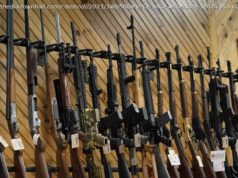U. S. stocks have bounced back from sharp early losses and are mixed in afternoon trading Tuesday. Investors are buying bonds and gold, traditionally considered safe assets, after North Korea…
NEW YORK (AP) – U. S. stocks have bounced back from sharp early losses and are mixed in afternoon trading Tuesday. Investors are buying bonds and gold, traditionally considered safe assets, after North Korea launched a midrange ballistic missile that crossed over northern Japan and fell into the Pacific Ocean. The dollar is down to its lowest level in two and a half years, and that is helping industrial and technology companies, which do a lot of business overseas.
KEEPING SCORE: The Standard & Poor’s 500 index was unchanged at 2,443 as of 1: 35 p.m. Eastern time. The Dow Jones industrial average bounced back from a 134-point loss and gained 25 points, or 0.1 percent, to 21,833. The Nasdaq composite added 11 points, or 0.2 percent, to 6,294. The Russell 2000 index of smaller-company stocks picked up 2 points, or 0.1 percent, to 1,384. Investors did more selling than buying, and most of the stocks on the New York Stock Exchange traded lower.
MISSILE NEWS: South Korea’s Joint Chiefs of Staff said the North Korean missile traveled over the northern Japanese island of Hokkaido. It seemed designed to show that North Korea can back up a threat to target the U. S. territory of Guam while also establishing a potentially dangerous precedent that could see future missiles flying over Japan.
The price of gold climbed $4.80 to $1,320.20. Bond prices jumped and yields sank. The yield on the 10-year Treasury note fell to 2.12 percent from 2.16 percent. Lower bond yields translate to lower interest rates, and banks fell as investors expected them to make less money from lending. M&T Bank slid $2.57, or 1.7 percent, to $149.43 and U. S. Bancorp lost 48 cents to $51.48.
CURRENCY: The dollar fell, with the ICE U. S. Dollar Index reaching to its lowest level in two and a half years during the day. The dollar rose to 109.12 yen from 109.09 while the euro rose to $1.2010 from $1.1979. The European currency is at its highest level in more than two years, as European Central Bank leaders do not seem poised to take action about its strength.
Industrials rose, including defense contractors. Raytheon climbed $3.24, or 1.8 percent, to $181.48 while Lockheed Martin added $4.24, or 1.4 percent, to $307.85. General Dynamics picked up $2.44, or 1.2 percent, to $200.31.
Technology companies were also up. Apple rose $1 to $162.48 and chipmaker Applied Materials advanced 35 cents to $43.98.
STORM DAMAGE: The Gulf Coast region continued to absorb heavy rains from Tropical Storm Harvey. More than 30 inches have fallen in some areas, leading to widespread flooding, and close to two feet more could fall over the next few days. Tens of thousands of people are seeking refuge in shelters.
On Wall Street, energy companies are falling with the price of crude oil. Companies that drill for oil in the Gulf or onshore in Texas are falling the most as investors worry about potential lost production. Anadarko Petroleum gave up 54 cents, or 1.3 percent, to $40.73 and Apache slumped 50 cents, or 1.3 percent, to $38.85.
Benchmark U. S. crude gave up 42 cents to $46.15 a barrel in New York. Brent crude, the international standard, fell 7 cents to $51.35 a barrel in London. Gasoline prices continued to rise.
Insurers continued to fall as investors wondered if Tropical Storm Harvey will lead to big losses. MetLife fell 93 cents, or 2 percent, to $46.64 and Assurant declined $1, or 1 percent, to $94.44.
BLOW THE WHISTLE: Finish Line forecast weak second-quarter results and the retailer cut its forecasts for the rest of the year. It said discounts on shoes are growing, which is hurting its profit margins. Its stock tumbled $1.94, or 18.7 percent, to $8.48. It was just the latest in a series of discouraging reports from sporting goods companies this month. Under Armour lost 59 cents, or 3.5 percent, to $16.35 and Foot Locker shed 53 cents, or 1.5 percent, to $35.17. Nike lost $1.39, or 2.6 percent, to 52.34.
Electronics retailer Best Buy had a solid second quarter and raised its forecasts for the year, but its stock sank after CEO Hubert Joly said he does not think the chain’s sales will stay as strong as they were in the most recent quarter. Its shares fell $7.37, or 11.8 percent, to $55.10. The stock is up 29 percent in 2017 and it’s been setting all-time highs.
SHRINKING BOARD: Consulting company Advisory Board is climbing after it confirmed recent rumors that it’s selling its health care business to UnitedHealth’s Optum unit and its education business to Vista Equity Partners. The company said it expects $2.58 billion in proceeds after taxes. Advisory Board gained $3.10, or 6.2 percent, to $52.95.
OVERSEAS: Germany’s DAX slid 1.5 percent and the CAC 40 in France fell 0.9 percent. The FTSE 100 index in Britain lost 0.9 percent. Asian indexes had a smaller reaction. In Japan, the benchmark Nikkei 225 slid 0.5 percent and South Korea’s Kospi lost 0.2 percent. In Hong Kong, the Hang Seng shed 0.1 percent.
___
AP Markets Writer Marley Jay can be reached at http: //twitter.com/MarleyJayAP His work can be found at https: //apnews.com/search/marley%20jay
AP Business Writer Yuri Kageyama in Tokyo contributed to this report.
Copyright 2017 The Associated Press. All rights reserved. This material may not be published, broadcast, rewritten or redistributed.






